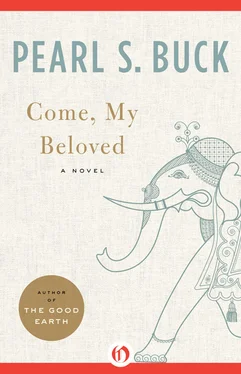IN THE VILLAGE, TED was expecting his first visitor from outside. Darya was freed from jail again, and he was coming to Vhai. While he was in jail he had heard of the lively young white man, American, for what Englishman could do such a thing, who had left his home and gone to Vhai to live like an Indian, though he was a Christian. His father was even a rich man.
“What is the rich father’s name?” Darya had inquired, guessing who it was.
“MacArd, Sahib—”
“Ah,” Darya said, “it was I who told that young man to go to the village.”
“And he obeyed you,” the new fellow prisoner said, admiring him.
“Ah,” Darya said, “I have known that young man from the hour he was born.
So, freed, he went immediately to the village of Vhai and found Ted, his fair skin blackened with the sun and his blue eyes like lamps in the darkness. The village was all astir and agitated with Darya’s coming, whose name was almost as great as Gandhi’s own, and Ted’s glory rose.
“Now,” Darya said, gazing at the tall young man grown excessively thin on village fare, “you are a true Indian. You might have come from Kashmir, you know, with those blue eyes. Aha, even a dhoti, and very skillfully worn!”
“Thanks,” Ted grinned. “It’s cooler.”
The crowd stood to listen and to admire.
“And this is your house,” Darya went on, gazing at the neat earthen house, now enlarged to two rooms and a small veranda, made of rough wooden posts and covered with thatch. “How do you support yourself?”
“Still on the old bounty, I fear,” Ted said.
“Expensive poverty, eh?” Darya said, half teasing. “The sadhu tradition is good, but you do not travel, eh?”
“I have not yet learned here all that I want to know,” Ted said. He made a sweeping gesture with his hands to include the crowd, and they fell back a few feet and grinned with modesty and shyness.
“The best of teachers,” Darya declared courteously.
They went into the little house then and sat down on mats on the earthen floor and they talked. Darya’s tongue was eager to wag after the many months in jail, and Ted was eager to listen to someone his superior, to receive instead of to give. The villagers were kind and good and they taught him much but their words were the words of children, while Darya’s language flowed in Hindustani or Marathi or Gujerati or English, or French or German, whatever language he chose, a dazzling array of tongues, all fluent and acute together.
“Gandhi is in Yarvada prison,” he began. “He is not well, and I hear there may have to be an operation. If so, he will be freed. Until I can talk with him, I must not plan the next strategy. To resist without violence demands the utmost in wisdom, in attack, in endurance. Violence is simple and easy, it is the sword of the stupid and dull-witted, and it always leaves chaos. To carry on a positive revolution without violence — ah, that is a challenge to intelligence!” Darya spoke with relish, a lively enjoyment upon his lean and vivid face. Prison had sharpened and refined both mind and body and had charged his spirit with compulsive energy.
“Is Gandhi the absolute leader?” Ted asked.
“Spiritually, yes,” Darya replied, “and until we know the feelings of his spirit none of us acts. The situation grows more complex every day. The hope of freedom sounds simple, does it not? But hope is a releasing force, and what it releases is not always simple. You would think it is enough to dream of India being free, but no, there are other more petty freedoms also desired. The Muslims cannot only be free Indians, they wish also to be free Muslims, and so it is with the Hindus, and now even with the Sikhs. And it is not enough for these lesser freedoms, but labor is divided, some pulling to the left with Russia and some to the right. Labor wishes to be free of capital. Meanwhile eighty-seven percent of capital in India is British, and Indian capital also wishes to be free of British capital, and above all, there is that for which I will fight with my whole life, and that is the freedom of these land people, the peasants, who are ruled by the landlords and the moneylenders, and now, alas, these two are becoming one great evil, for the land is falling into those grasping hands, and landowners do not even come near the land. They live in the cities and send out their agents to take the land away from the peasants who cannot pay their rents and debts.”
It was true. Moneylender and landlord were becoming one and because of this the peasant was being pushed off the earth. “Dangerous rumors are creeping over the border from Russia,” Darya went on, “sweet promises to seize the land by force from the landlords and give it again to the people. While Gandhi insists on nonviolence, the people are muttering of force. I have asked Gandhiji what he will do if the peasants break into violence.”
Ted had no answer. He was still learning of the deep restlessness in the heart of India and he had never seen Gandhi.
Through the next few days they talked as they could, but Darya must stop often to greet visitors, for when it was known that he was there, men walked for many miles to look at him, to hear his voice and touch his hands, and to ask him, “When shall be we free, punditji, and will the land then be given to us again?”
Darya made always the same steady answer. “Our only hope is in Gandhiji.”
At night Ted could speak in English without fear of offending those who could not understand, for he would not speak during the day in a language foreign to the villagers, a delicacy with which Darya was impatient. For, as Ted soon saw, with all his passion and concern for the peasants, Darya was not one of them. He could be impatient with them and speak to them with unconscious arrogance, whereas Ted, the American, did honestly feel no difference between a peasant and any other man. He wondered at Darya’s lack and did not know how to speak of it, for understanding is a gift and Darya did not have it with each man as he was. This was the sin and the fault in the intellectual Indian, and if the revolution failed, Ted thought, it would be because of it. For none was quicker to observe this arrogance than a peasant himself, and after a few days the villagers drew away from Darya and Ted felt them come nearer to him, though he was a foreigner, than they were to Darya. They were courteous and kind, but they withdrew, and Darya did not seem to notice.
After Darya had gone away, on foot, his imperious head held high and his mind full of plans for the people’s freedom and his heart full of indignation on their behalf, though he was a rich man who had given up all he had for their sake, yet the villagers waited until he was gone before they came crowding into Ted’s little house again, asking their questions about Gandhi and how far freedom was away. They respected Darya and knew him a leader, but they knew, too, that though he would give up his life for them, he could not eat with them or sleep under their thatched roofs.
The day after Darya was gone, Ted received a letter brought as usual by a carrier on foot. The envelope was square, the paper was cheap and pink, and it was stamped with the name Fordham. The writing was not that of Mr. Fordham, and certainly he would not get a pink letter from Mrs. Fordham. He opened the letter and found inside two double sheets covered with a childish handwriting in purple ink. The name at the end of these lines was Ruthie and now he was embarrassed as well as surprised. She said frankly that she wrote without the knowledge of her parents, and because she was lonely. She had no companions of her own age, she was nineteen, and her parents would not let her meet any of the young Englishmen in business or Government, lest there be talk among the Christians.
Читать дальше












